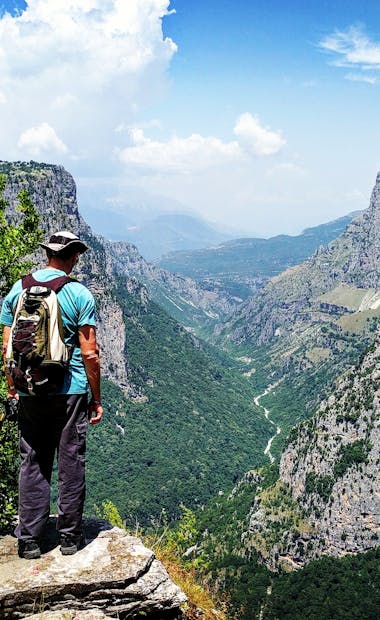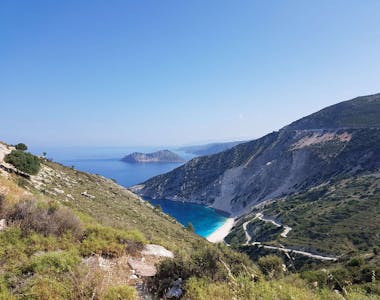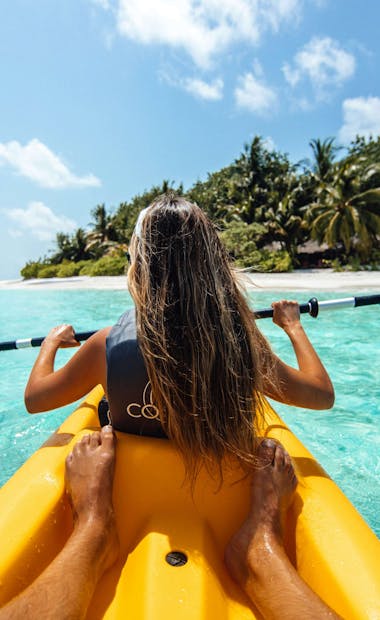
Greece Walking Tours
Exploring Greece on foot. From the mainland to the islands!
Popular tours
- Save3%
 View Tour
View TourSail in Greece - Corfu - 8 Days
- Corfu Town to Corfu Town
- Age group: 7 - 99
- Max group size: 25
Was:£665From£645 - Save16%
 View Tour
View TourSailing Greece - Mykonos to Santorini - 8 Days
- Mykonos to Firá
- Age group: 16 - 100
- Max group size: 10
Was:£1,199From£1,009 - Save21%
 View Tour
View TourGreek Island Hopping: Paros, Ios & Santorini Sunsets - 7 Days
- Athens to Firá
- Age group: 18 - 39
- Max group size: 16
Was:£1,149From£910 - Save26%
 View Tour
View TourSail & Hike Greece: Athens to Mykonos - 8 Days
- Lávrio to Mykonos
- Age group: 15 - 99
- Max group size: 11
Was:£1,285From£954 - Save3%
 View Tour
View TourSail in Greece - Rhodes - 8 Days
- Rhodes to Rhodes
- Age group: 1 - 99
- Max group size: 12
Was:£707From£686 - Save3%
 View Tour
View TourSail in Greece - Zante - 8 Days
- Zakynthos to Zakynthos
- Age group: 4 - 90
- Max group size: 25
Was:£665From£645
Greece Walking Tours
Ah, Greece! A land that beckons adventurers and nature enthusiasts to lace up their boots and embark on a walking journey like no other. If you're yearning to immerse yourself in the raw beauty of Greece's landscapes while indulging in a multisensory exploration, you've arrived at the right place. Our travel agency is delighted to present our exquisite Multiday Walking Tours in Greece, meticulously crafted for those seeking an unforgettable walking vacation.
Greece walking tours offer an extraordinary opportunity to traverse ancient paths, breathe in the aromatic scents of wildflowers, and witness the dramatic fusion of mountains and sea. Picture yourself strolling through olive groves, hearing the whispers of history on the wind, and discovering hidden villages untouched by time.
Your odyssey begins in the mythical region of Mount Olympus, where ancient legends come to life amidst towering peaks. As you ascend through enchanting forests and moss-covered trails, you'll feel a kinship with the gods who once roamed these slopes. Be prepared for breath-taking vistas that stretch as far as the eye can see, rewarding your efforts and igniting a sense of awe within your soul.
Next, our walking tours will lead you to the captivating island of Crete. With its rugged landscapes and idyllic coastal paths, Crete promises an unforgettable walking experience. Meander through the Samaria Gorge, a natural wonder known for its dramatic cliffs and crystal-clear streams. Inhale the invigorating scent of wild thyme and witness the dance of rare Cretan wild goats, an exclusive encounter only found in this part of the world.
No Greek walking vacation is complete without exploring the famous monasteries of Meteora. As you trek through this UNESCO World Heritage site, you'll be awestruck by the surreal beauty of monasteries perched atop towering rock formations. Let the harmony of nature and spirituality seep into your being, leaving you with a profound sense of serenity and wonder.
But Greece's allure doesn't end there. Our walking tours will unveil the hidden gems of the Peloponnese, where history and natural beauty intertwine seamlessly. Traverse the trails of ancient Olympia, the birthplace of the Olympic Games, and envision the glory of past athletic feats. Wander through the verdant valleys of Arcadia, where mythology unfolds amidst lush forests, picturesque villages, and quaint stone bridges.
Greece is a treasure trove for walkers, offering a rich tapestry of landscapes, cultural heritage, and warm hospitality. It's a chance to embark on a personal voyage of discovery, where each step uncovers a new layer of the country's captivating history and natural splendour.
Indulge in the simple pleasures of savouring traditional Greek cuisine, bursting with flavours of fresh produce, locally sourced olive oil, and aromatic herbs. Engage with the welcoming locals,
When is the best time to visit Greece?
The best time to visit Greece depends on your preferences and the experiences you seek. Greece enjoys a Mediterranean climate, characterized by mild winters and hot, dry summers. Here's a breakdown of the seasons to help you plan your ideal trip:Spring (April to June): Springtime in Greece is a delightful season, with mild temperatures, blooming flowers, and fewer crowds. It's an excellent time for walking tours, as the landscapes are lush and vibrant. The weather is ideal for exploring archaeological sites and enjoying outdoor activities. However, do note that some islands and tourist services might have limited availability before the peak summer season.
Summer (July to August): The summer months are Greece's high season when the weather is hot and sunny. It's the perfect time to visit if you're looking to soak up the sun, enjoy beach activities, and experience the vibrant island nightlife. However, popular tourist destinations can be crowded, and temperatures can reach their peak, especially in July and August. Booking accommodations and activities in advance is advisable during this time.
Autumn (September to October): Autumn in Greece offers pleasant temperatures and fewer crowds compared to the summer months. The sea is still warm, allowing for enjoyable beach visits, and the landscapes begin to showcase beautiful autumn colours. It's an excellent time for walking tours and exploring archaeological sites without the sweltering heat. September, in particular, is a popular month for travellers seeking a balance between good weather and fewer tourists.
Winter (November to March): Winter in Greece is mild, especially in the southern regions and the islands. While the weather can be unpredictable, it's a great time to explore historical sites, delve into cultural experiences, and enjoy the country's rich heritage without the crowds. The mountainous regions, such as Mount Olympus and the ski resorts in northern Greece, offer opportunities for winter sports enthusiasts.
Keep in mind that specific destinations may have slightly different weather patterns and seasonal variations. It's always recommended to check the weather forecast and plan accordingly based on the activities and regions you wish to explore.
Will I need a visa to travel to Greece?
The visa requirements for traveling to Greece vary depending on your nationality and the purpose and duration of your visit. Here's an overview to help you understand the general guidelines:European Union (EU) and Schengen Area Countries: If you are a citizen of an EU member state or a country within the Schengen Area, which includes many European countries, you do not need a visa to enter Greece. You can travel freely within the Schengen Area for a maximum of 90 days within any 180-day period. Make sure to carry a valid passport or national identity card for identification purposes.
Non-EU/Non-Schengen Area Countries: Citizens of countries outside the EU and Schengen Area may require a visa to enter Greece. The specific visa requirements vary based on your nationality and the purpose of your visit, such as tourism, business, or study. It's essential to check the Greek embassy or consulate in your home country or the official website of the Hellenic Republic Ministry of Foreign Affairs for the most accurate and up-to-date information regarding visa requirements.
Visa-Free Agreements: Greece has visa-free agreements with several countries, allowing their citizens to visit for tourism or business purposes without a visa for a limited period. These agreements typically apply to stays of up to 90 days within a specific timeframe. Again, it's crucial to consult the appropriate embassy or consulate or refer to the official sources mentioned above to confirm whether you qualify for visa-free entry.
Regardless of your visa requirements, it's important to ensure that your passport is valid for at least six months beyond your intended departure date from Greece. Additionally, it's advisable to have travel insurance that covers any potential medical expenses and emergencies during your stay.
What are the most popular walks in Greece?
Greece is a haven for walking and hiking enthusiasts, offering a diverse range of scenic trails and captivating landscapes to explore. Here are some of the most popular walking and hiking tours in Greece:Samaria Gorge, Crete: Located in the southwest of Crete, the Samaria Gorge is one of Europe's longest gorges and a favourite among hikers. This 16-kilometer trail takes you through breath-taking landscapes, including towering cliffs, fragrant pine forests, and crystal-clear streams. The highlight of the hike is reaching the charming coastal village of Agia Roumeli, where you can reward yourself with a refreshing swim in the Libyan Sea.
Mount Olympus: As the mythical home of the gods, Mount Olympus attracts both avid hikers and mythology enthusiasts. The trails on Mount Olympus cater to various skill levels, with options ranging from leisurely walks to challenging ascents. Embark on a journey to the summit of Mytikas, the highest peak in Greece, and be rewarded with panoramic views that stretch across the Aegean Sea.
Vikos Gorge, Zagori: Nestled in the Zagori region of northern Greece, the Vikos Gorge is renowned for its dramatic landscapes and rugged beauty. Hiking through the gorge allows you to marvel at the sheer cliffs, traverse stone bridges, and witness the untamed wilderness of the area. The trail offers breath-taking viewpoints, including the famous "Oxya" rock, providing a unique perspective of this natural wonder.
Meteora, Thessaly: Meteora is not only famous for its awe-inspiring monasteries perched atop towering rock formations but also for its excellent hiking opportunities. Explore the network of trails that lead you through this UNESCO World Heritage site, offering panoramic views of the monasteries, lush valleys, and remarkable rock formations. It's an experience that combines spirituality, history, and the wonders of nature.
Menalon Trail, Peloponnese: The Menalon Trail is an enchanting hiking route that spans approximately 75 kilometers, winding through the stunning landscapes of the Peloponnese region. This well-marked trail takes you through picturesque villages, dense forests, verdant valleys, and tranquil streams. Immerse yourself in the rural charm of the Peloponnese and indulge in the traditional local cuisine along the way.
These are just a few examples of the popular walking and hiking tours in Greece. Whether you prefer coastal paths, mountainous terrains, or cultural landscapes, Greece offers a multitude of options to suit every preference and skill level. Remember to plan your hikes according to your fitness level, pack suitable gear, and adhere to safety guidelines to make the most of your adventure in the Greek wilderness.
What is the local currency in Greece, and can I use credit cards?
The local currency in Greece is the Euro (€). It is widely accepted throughout the country, and you can exchange your currency for Euros at banks, currency exchange offices, and some hotels. ATMs are also widely available, allowing you to withdraw Euros directly from your bank account or using your credit or debit card.
Credit cards are widely accepted in Greece, especially in larger cities, tourist areas, and established businesses. You can use major credit cards such as Visa, Mastercard, and American Express at hotels, restaurants, shops, and most tourist attractions. However, it's always a good idea to carry some cash, especially for smaller establishments, rural areas, or when visiting remote islands where card payment options may be limited.
When using credit cards in Greece, you may be asked to provide identification, such as a passport, to verify your identity. Contact your bank or credit card provider before your trip to inform them of your travel plans and ensure that your card will work internationally without any issues. They can also provide you with information regarding any potential fees or charges for using your card abroad.
It's worth noting that some smaller establishments, particularly in remote villages or on certain islands, may prefer or only accept cash payments. Therefore, it's advisable to carry a sufficient amount of cash for such situations or when making small purchases.
Overall, Greece is a relatively card-friendly country, but having a combination of cash and credit cards will ensure that you can comfortably handle your expenses during your visit.
Is Greece a good destination for solo travellers?
Yes, Greece is an excellent destination for solo travellers. It offers a welcoming and friendly atmosphere that makes it easy to connect with locals and fellow travellers alike. Here are some reasons why Greece is a great choice for solo adventurers:
Warm Hospitality: Greeks are known for their warm hospitality and friendliness towards visitors. As a solo traveller, you'll likely find locals eager to engage in conversations, share their culture, and provide recommendations for places to visit. You may even be invited to join in traditional celebrations or enjoy a meal with newfound friends.
Safe and Secure: Greece is generally considered a safe country for travellers. The crime rate is relatively low, and locals are accustomed to welcoming tourists from around the world. Like any travel destination, it's important to take basic precautions and be aware of your surroundings, but overall, solo travellers can feel comfortable and secure exploring Greece's cities, towns, and islands.
Well-Established Tourism Infrastructure: Greece is a popular tourist destination, which means it has a well-developed tourism infrastructure. From accommodations and transportation to tour operators and activities, you'll find a wide range of options to suit your preferences and budget. The availability of hostels, guesthouses, and social gathering places makes it easy to meet other solo travellers and join organized tours or activities.
Varied Experiences: Greece offers a diverse range of experiences, from historical sites and archaeological wonders to stunning beaches, picturesque islands, and breath-taking landscapes. Whether you're interested in ancient history, outdoor adventures, or simply relaxing by the sea, Greece has something to offer every solo traveller's interests and desires.
Solo-Friendly Activities: Greece's vibrant culture and natural beauty provide ample opportunities for solo exploration. You can embark on self-guided walking tours, join organized excursions, visit museums and archaeological sites, or simply wander through charming neighbourhoods and immerse yourself in the local way of life. The country's islands, with their unique character and laid-back atmosphere, are particularly well-suited for solo travellers looking to relax, unwind, and meet other like-minded adventurers.
Remember to stay informed about local customs and traditions, respect cultural norms, and take necessary precautions to ensure a smooth and enjoyable solo travel experience. With its rich history, stunning landscapes, and warm hospitality, Greece offers a delightful and rewarding destination for solo travellers seeking new experiences and personal discoveries.
How fit do I need to be for a walking tour?
The fitness level required for a walking tour in Greece can vary depending on the specific itinerary and trails you choose. Greece offers a wide range of walking tours, from leisurely coastal walks to more challenging mountain hikes. Here are some factors to consider when assessing your fitness level for a walking tour in Greece:Trail Difficulty: Different walking tours have varying levels of difficulty. Some tours may involve mostly flat and easy terrain, while others may include steep ascents, uneven surfaces, or long distances. It's essential to carefully review the tour descriptions and difficulty ratings provided by the tour operator to ensure that you select a tour that matches your fitness level and hiking experience.
Duration and Distance: Consider the duration and daily distances covered during the walking tour. Longer tours or those with more extensive daily hikes may require a higher level of endurance and stamina. If you're new to walking tours or have a lower fitness level, it may be advisable to start with shorter or less strenuous itineraries.
Elevation Gain: Pay attention to the elevation gain on the trails you'll be hiking. Steep inclines or significant changes in elevation require additional effort and can be physically demanding. If you're not accustomed to uphill climbs, it may be beneficial to incorporate some hill training or stair climbing into your exercise routine before your trip.
Walking Experience: Previous experience with walking or hiking tours can be helpful, but it's not always necessary. Some tours cater to beginners or those with limited hiking experience, while others are designed for more seasoned hikers. Be honest with yourself about your abilities and choose a tour that matches your comfort level.
Personal Fitness: Assess your overall fitness level, taking into account your cardiovascular endurance, leg strength, and overall mobility. Regular exercise, such as walking, hiking, or other aerobic activities, can help prepare your body for the physical demands of a walking tour.
It's always advisable to consult with the tour operator or seek professional advice if you have any concerns about your fitness level or specific health conditions. They can provide guidance on selecting an appropriate tour or recommend training exercises to help you prepare.
Remember, it's essential to listen to your body during the tour, pace yourself, and take breaks as needed. Walking tours are meant to be enjoyable and immersive experiences, so selecting a tour that matches your fitness level will ensure a more comfortable and rewarding journey through Greece's scenic landscapes.
Will I require any vaccinations to travel to Greece?
As of my knowledge cut-off in September 2021, there are no specific vaccinations required for entry into Greece. However, it's always advisable to stay up to date with routine vaccinations recommended by your country of residence, such as measles-mumps-rubella (MMR) vaccine, diphtheria-tetanus-pertussis vaccine, varicella (chickenpox) vaccine, and influenza vaccine.
Additionally, it's recommended to consult with a healthcare professional or travel health clinic at least 4-6 weeks before your trip to Greece to get personalized advice based on your health condition, vaccination history, and any specific health concerns.
They can provide up-to-date information on any recommended vaccinations or precautions for travel to Greece, taking into account factors such as the duration of your stay, specific destinations within Greece, and planned activities.
It's also important to be aware of any health advisories or travel alerts issued by your country's health authorities or the World Health Organization (WHO) regarding Greece. They may provide additional recommendations or requirements related to vaccinations or health precautions for travellers.
Remember to follow good hygiene practices during your trip, such as regular handwashing, using hand sanitizers, and practicing safe food and water precautions, to minimize the risk of contracting any travel-related illnesses.
Please note that vaccination requirements and recommendations can change over time, so it's essential to verify the latest information before your trip. Consult with a healthcare professional or refer to official sources such as the Centers for Disease Control and Prevention (CDC) or the World Health Organization (WHO) for the most accurate and up-to-date advice regarding vaccinations for travel to Greece.
How does the rooming work on walking tours?
Small group tours in Greece typically involve a set itinerary where you travel with a group of fellow travellers and a tour leader/guide. Accommodation arrangements vary depending on the specific tour you choose. Here are some common aspects of rooming arrangements on small group tours:
Shared Rooms: In order to promote camaraderie and facilitate interaction among group members, most tours arrange shared accommodation. This means you will be paired with another member of the same gender from the group to share a room. Roommates may sometimes change periodically throughout the tour.
Single Supplement: If you prefer to have your own room and privacy, you may have the option to pay a single supplement fee. This additional fee allows you to have your own room for the duration of the tour. However, please note that single supplements can vary in cost and availability.
Roommate Matching: Tour operators usually offer roommate matching services, where they try to pair you with a suitable roommate based on your preferences, such as age range. This can help ensure compatibility and a more enjoyable experience for all participants.
Rooming Preferences: When booking your small group tour, it's important to communicate your rooming preferences to the tour operator. If you have specific requirements or preferences, such as sharing with a friend or a specific roommate request, it's advisable to inform the tour operator during the booking process.
It's important to carefully read the tour details and inclusions provided by the tour operator to understand their specific rooming policies. If having your own room is a priority, make sure to inquire about the availability of single supplements and any associated costs before booking your tour.
Keep in mind that while sharing a room with a fellow traveller can be a great way to meet new people and build connections, having your own room provides more privacy and flexibility. Consider your preferences and the dynamics of the tour when deciding whether to opt for a shared room or pay for a single supplement.
Remember to communicate your needs and preferences clearly with the tour operator during the booking process to ensure a comfortable and enjoyable accommodation experience on your small group tour in Greece.
What is the food like in Greece?
Greek cuisine is renowned for its fresh ingredients, vibrant flavours, and Mediterranean influences. It offers a diverse array of dishes that showcase the country's rich culinary heritage. Here's a glimpse into the delightful world of Greek food:Fresh and Flavourful Ingredients: Greek cuisine relies heavily on locally sourced, seasonal ingredients. You'll find an abundance of fresh fruits and vegetables, aromatic herbs, high-quality olive oil, feta cheese, yogurt, seafood, and tender meats. The use of herbs like oregano, thyme, and rosemary adds distinct flavours to many Greek dishes.
Meze and Sharing Culture: Greeks love to share meals with friends and family, and one of the most beloved dining traditions is meze. Meze refers to a variety of small, flavourful dishes that are meant to be shared. It can include classics like tzatziki (yogurt-cucumber dip), dolmades (stuffed grape leaves), taramasalata (fish roe dip), and spanakopita (spinach and feta pastry).
Greek Salad: The Greek salad, or horiatiki, is a popular and refreshing dish known worldwide. It typically includes tomatoes, cucumbers, onions, olives, and feta cheese, drizzled with olive oil and sprinkled with herbs. It's a delightful combination of flavours that perfectly captures the essence of Greek cuisine.
Souvlaki and Gyro: Souvlaki and gyro are iconic Greek street foods. Souvlaki consists of skewered and grilled pieces of marinated meat, often served with pita bread and a variety of condiments like tzatziki, tomatoes, onions, and fries. Gyro, on the other hand, features thinly sliced meat (typically pork or chicken) wrapped in pita bread with tzatziki sauce, tomatoes, onions, and sometimes fries.
Seafood: With its extensive coastline and numerous islands, Greece offers a bounty of seafood options. Fresh fish like sea bream, sea bass, sardines, and octopus are commonly enjoyed in tavernas and seaside restaurants. Grilled or fried, seafood dishes showcase the simplicity and flavours of the Mediterranean.
Moussaka and Pastitsio: Moussaka and pastitsio are two classic Greek dishes with layers of flavours. Moussaka is a baked casserole with layers of eggplant, ground meat (usually lamb), and creamy béchamel sauce. Pastitsio features layers of pasta, ground meat, and béchamel sauce, creating a comforting and hearty dish.
Honey and Greek Sweets: Greece is renowned for its delicious honey, thanks to the diverse flora and wildflowers found across the country. Honey is used generously in Greek sweets and desserts, such as baklava (layered pastry with nuts and honey), loukoumades (deep-fried dough balls drizzled with honey), and galaktoboureko (semolina custard wrapped in phyllo pastry).
Greek Wines and Spirits: Greece has a rich winemaking tradition dating back thousands of years. Enjoy a variety of Greek wines, from robust reds like Agiorgitiko and Xinomavro to crisp whites like Assyrtiko and Moschofilero. Greek spirits like ouzo, raki, and tsipouro are also popular, often enjoyed as aperitifs or accompanied by meze.
Greece's culinary landscape offers a delightful fusion of flavours, making it a paradise for food lovers. Whether you're indulging in meze, savouring fresh seafood, or exploring traditional dishes, Greek cuisine is sure to tantalize your taste buds and leave you craving for more.
Can I drink the tap water in Greece?
Yes, tap water in Greece is generally safe to drink. The water supply in major cities and tourist areas undergoes regular monitoring and treatment to ensure its quality meets health standards. Drinking tap water is common practice for locals and visitors alike.
However, in some remote or rural areas, the water may have a different taste or quality due to variations in local infrastructure or sources. In such cases, it's recommended to rely on bottled water, which is readily available in stores and supermarkets throughout the country.
If you have concerns about the water quality at your specific location or if you prefer to err on the side of caution, you can always choose to drink bottled water, which is widely available and affordable in Greece.
Additionally, it's important to note that individual sensitivities to water quality can vary, so if you have a particularly sensitive stomach or if you're unsure about the tap water, it may be best to opt for bottled water for drinking and brushing your teeth.
Overall, while tap water in Greece is considered safe for consumption in most areas, it's always a good idea to follow your personal preferences and take necessary precautions to ensure your well-being during your trip.
Are there any cultural norms in Greece I should follow?
Yes, Greece has its own unique cultural norms and customs that are worth respecting as a visitor. Here are some key cultural norms to keep in mind during your stay:
Greetings: Greeks are generally warm and friendly. It's common to greet people with a handshake and direct eye contact. In more informal settings, close friends may greet each other with hugs or cheek kisses. When entering a shop or restaurant, it's polite to greet the staff with a simple "kalimera" (good morning), "kalispera" (good evening), or "yasou" (hello).
Respect for Religion: Greece has a strong Orthodox Christian heritage, and religious customs are an important part of the culture. When visiting churches or monasteries, it's important to dress modestly and avoid wearing revealing clothing. Additionally, it's respectful to maintain a quiet and reverent demeanor within these sacred spaces.
Punctuality: While Greeks are generally relaxed about time, it's still considered polite to be punctual for scheduled appointments and meetings. However, in social gatherings, it's common for Greeks to arrive a bit later than the stated start time.
Dining Etiquette: When invited to someone's home for a meal, it's customary to bring a small gift, such as flowers or a bottle of wine, as a token of appreciation. During meals, it's polite to wait until the host initiates the start of the meal or says "kalí óreksi" (good appetite) before eating. It's also customary to try a bit of everything served on the table. In restaurants, tipping is customary but not mandatory. A 10% tip is generally appreciated for good service.
Body Language and Gestures: Greeks are expressive and often use hand gestures and facial expressions to communicate. It's important to note that certain hand gestures that may be innocent or even positive in your culture could have different meanings in Greece. For example, the "OK" gesture (forming a circle with your thumb and index finger) is considered offensive in Greece. It's always a good idea to observe and follow the local customs regarding body language.
Public Behaviour: When visiting religious sites, museums, or historical sites, it's important to respect the rules and regulations, such as refraining from touching artefacts or taking photographs if it's prohibited. It's also courteous to avoid loud conversations or disruptive behaviour in public places.
Dress Code: Greeks generally dress stylishly and take pride in their appearance. While casual attire is acceptable in most situations, it's advisable to dress slightly more formally when visiting religious sites or upscale establishments. Avoid wearing revealing or overly casual clothing in such settings.
By being aware of and respecting these cultural norms, you'll have a more enjoyable and harmonious experience in Greece. Embracing the local customs will also contribute to positive interactions with locals and a deeper appreciation of Greek culture and traditions.
What should I pack for a walking trip to Greece?
When packing for a walking trip to Greece, it's important to consider the activities, weather, and terrain you'll encounter. Here's a list of essential items to pack:
Comfortable Walking Shoes: Invest in a good pair of comfortable walking shoes or hiking boots with good traction. Make sure they are broken in before your trip to avoid blisters or discomfort during long walks.
Lightweight Clothing: Pack lightweight, breathable clothing suitable for walking in warm weather. Opt for moisture-wicking fabrics that dry quickly. Include a mix of short-sleeved shirts, long-sleeved shirts for sun protection, lightweight pants or shorts, and a light jacket or sweater for cooler evenings.
Rain Gear: Greece experiences occasional rainfall, especially in the spring and autumn. Pack a lightweight, waterproof jacket or poncho to stay dry during showers. Consider waterproof pants or a rain cover for your backpack if you anticipate hiking in wet conditions.
Sun Protection: Greece enjoys plenty of sunshine, so it's crucial to protect yourself from harmful UV rays. Pack a wide-brimmed hat, sunglasses, and sunscreen with a high SPF. Consider a lightweight scarf or neck gaiter for additional sun protection.
Daypack or Backpack: A comfortable and sturdy daypack is essential for carrying your essentials during walks. Ensure it has padded straps and a waist belt for better weight distribution. A hydration system or water bottle pocket is also convenient for staying hydrated on the trails.
Hiking Gear: Depending on the difficulty and duration of your walks, you may need additional hiking gear. Consider packing trekking poles for stability and to reduce strain on your joints, a headlamp or flashlight for night-time walks or cave explorations, and a small first aid kit for minor injuries.
Snacks and Water: Pack lightweight snacks like energy bars, trail mix, or dried fruit to keep you fuelled during walks. Carry a reusable water bottle to stay hydrated throughout the day. It's advisable to carry enough water for the duration of your walk, as water sources may be limited in some areas.
Travel Documents: Don't forget to pack your passport, travel insurance documents, and any necessary visas. Keep them in a secure and easily accessible place, along with a photocopy or digital copy stored in a separate location.
Other Essentials: Include insect repellent, a small towel or microfiber cloth, a travel-sized toiletry kit, a basic first aid kit, and any necessary prescription medications. A money belt or secure pouch can help keep your valuables safe during your walks.
Electronics: Consider bringing a smartphone or camera to capture the beautiful scenery. Don't forget to pack the necessary chargers and adapters. It's also a good idea to have a power bank for recharging your devices on the go.
Remember to pack light and efficiently, as you'll likely be carrying your belongings during walks. Check the weather forecast and specific requirements of your walking tour to customize your packing list accordingly. And don't forget to leave some space for souvenirs you may want to bring back from Greece.
Lastly, check with your tour operator or local guides for any specific recommendations or additional items to pack based on the terrain and activities planned during your walking trip.


Book With Confidence
Monthly Payments
Spread the costs with no interest or additional fees
Best Price Guarantee
We won't be beaten on price. If you find this adventure at a lower price please get in touch!
Reserve now & pay later
Reserve your adventure today and pay later, free of charge
ATOL protected
Book with confidence
Hold your space today, for free
or book your trip with a deposit and then pay the rest in instalments.
Reserve your flights with us
Add flights to your booking and we'll take care of the rest. You'll get 24/7 support from our team & ATOL protection.
Speak to our experts
Call or email our expert team to find out more and help with ideas and planning.









